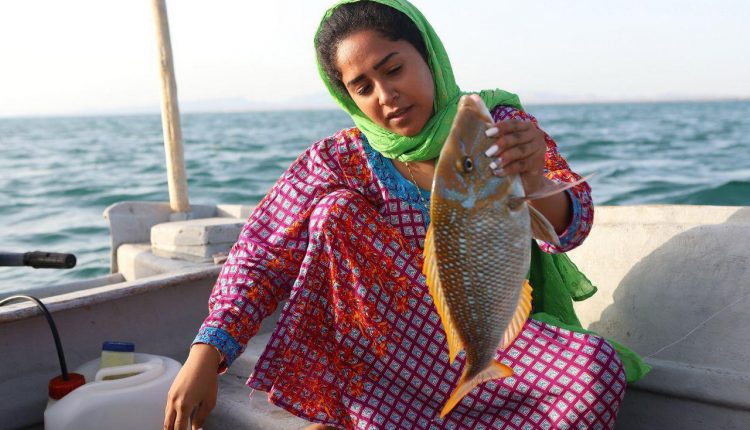People calls her Khajo; Khadijeh Ghodsinejad, 22 years old, born in Hengam. She is a fisher, like many other women of Hengam, an island known as the fisher-woman and the financial responsible of the family. The story of the fisher-women of the island has been covered by the Iranian media for several years and their reports. But this visibility is valuable when it can help empower and develop their social status.
Hengam Island with a population of about 500 is located in the south of Qeshm Island. People have limited job opportunities to earn money due to their special geographical location. Fishing is the most important occupation of the natives of the Island. Hengam Island has been considered as one of the tourist attractions with the prosperity of the tourism industry in Qeshm. Fishing and transporting tourists between Hengam Island and Qeshm and selling handicraft products are the three main jobs for the people of the Island. But tourism is limited to certain periods; Due to the climate of the region. Fishing is the most important occupation of the people of Hengam.
Women works side by side with men on the island. According to an old fishing tradition, women can also go fishing with men. However, many women fish alone, not with their husbands, fathers, or brothers. They are, however, largely overlooked. In addition, patriarchal culture and the absence of women employment laws also contributed to women’s plight as fishers.
Many of these women are heads of households or, for some reason, provide support for their families; fishing without the minimum facilities is difficult. Khadijeh has many dreams. Developing a business and support other women through entrepreneurship; “These are my goals. I want to build an ecotourism residence and hire several people through these businesses, so for example, 7-8 women can generate income.”
Her most important goal is to establish an ecotourism resort: “If we have a residence, other fish that we catch with great difficulty and depreciation and the high cost of gasoline, instead of selling very cheaply to Patchal’s (local fishmongers) and the island’s shops, we will serve delicious food in our traditional accommodation for travelers.”
Currently, Khadijeh and other women fisher go to sea for their livelihood; this is extremely difficult work and they make very little money. Despite of this, Khadijeh has diligently opened an online store, her Instagram page: “Through this profile, I tried to send my own fish and other women directly to the customer through orders from other cities, instead of selling it cheaply to Pachal’s, which maybe it will give us even better profit.” Online shops also have their own difficulties these days, which Khadijeh says I am struggling with.
They won’t get license, because they are women
For many years, fishing has been the most important business activity for the people of Hengam Island, two kilometers southeast of Qeshm Island. The boom of tourism has also resulted in the sale of oysters and the reception of travelers. Due to its amazing attractions, Hengam has attracted a lot of attention from domestic and foreign tourists in recent years, and this has provided the income and economic prosperity of some families on the island. The island has a sandy and rocky beach, parts of the beach also look shiny due to the presence of some mineral in the sand. The island has three villages called old Hengam, new Hengam (Mashi in by locals) and Hengam Ghail, which have no roads and no cars; With simple, friendly and hospitable residents.
Most of the island’s economy is based on the work of the women, who traditionally fish alongside or without men. Fishing is the sole occupation of an elderly woman on this island who has been doing it for 50 years. The Iranian Fisheries Department, however, does not give them a fishing license because they are women.
“They say women shouldn’t work in fishing.” This is the answer that officials give to women who have seeking permission. “If our boat is damaged, we will not be able to get any damaged insurance and moreover, we don’t have petrol allowance. Why isn’t fishing a woman’s job? We have been fishing for all these years. We do everything on this island. the economy of the island is in the hands of women.” These are the words of Khadijeh.
Hengam Island women do not use nets or trawls to fish. Using trawl nets to sweep the seabed destroys the aquatic environment. Sometimes they go to sea for a week and return only with one day’s catch, but there are also times when they catch a lot. Their income is not so much that they can save, for example, that if the sea were stormy for a few days, they would be comfortable thinking about the days when it would not be possible to fishing.
Khadijeh said “A lot of the time we don’t catch any fish even after spending four days at sea.” “Fishing provides no definite income.”
Over the past few months, Iranian officials have repeatedly commented on these women, but this has not affected their lives. As early as this summer, Iran’s vice president for communications and follow-up to the implementation of the constitution said that not issuing permits to these women was against the law. A few weeks later, the head of fisheries in Hormozgan province claimed that the women of the island had no restrictions on fishing.
The lack of fishing licenses for women, however, means that they cannot enjoy the same privileges and facilities that men enjoy, such as access to cheaper fuel and other government facilities for their prosperity.
Last but not least, local and national officials have been claiming that women on the island have been granted fishing licenses. Of course, the news that Khadijeh says is not true, or at least they have not been told anything until today.
.
This article has been translated and republished based on a report in the Shahrvand Online.



















